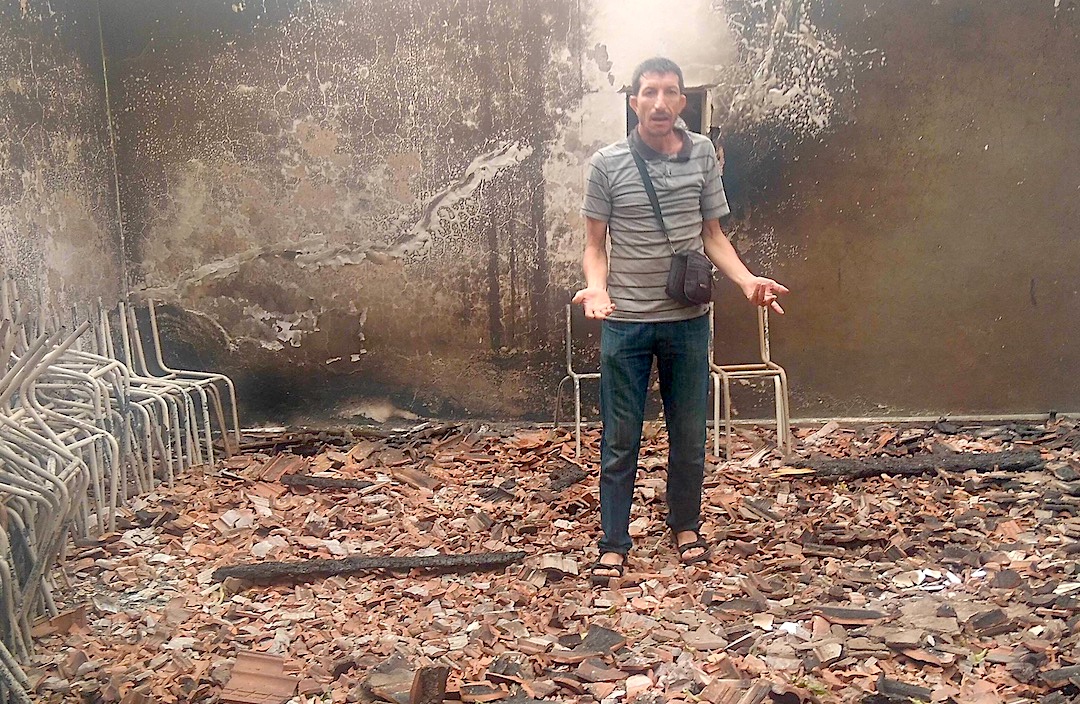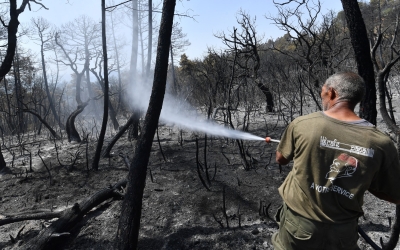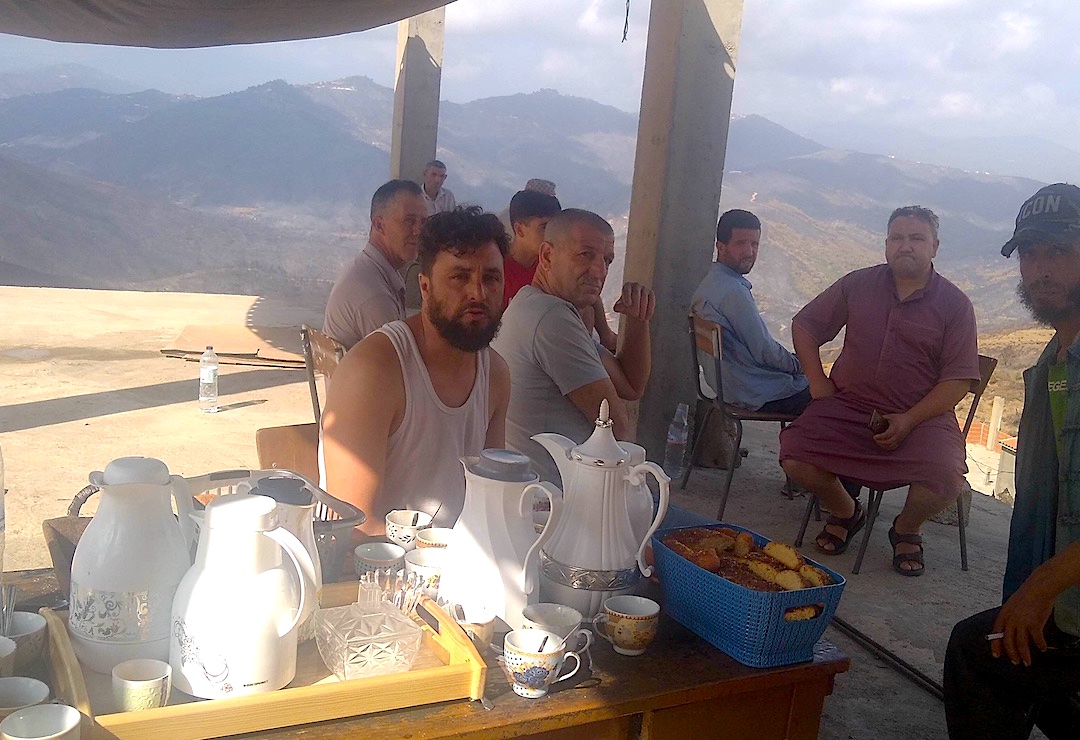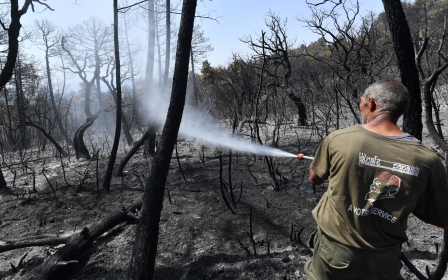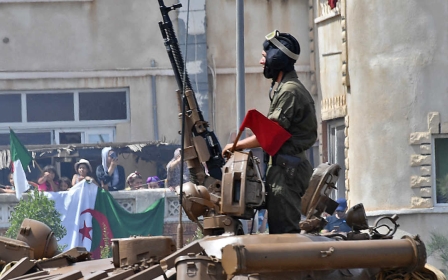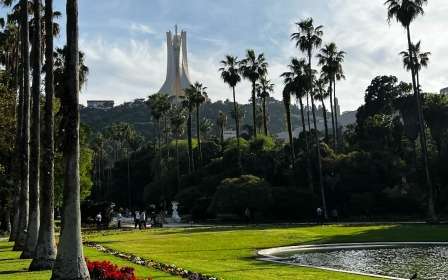'I wish I had died as well': Algeria's wildfire survivors mourn loved ones
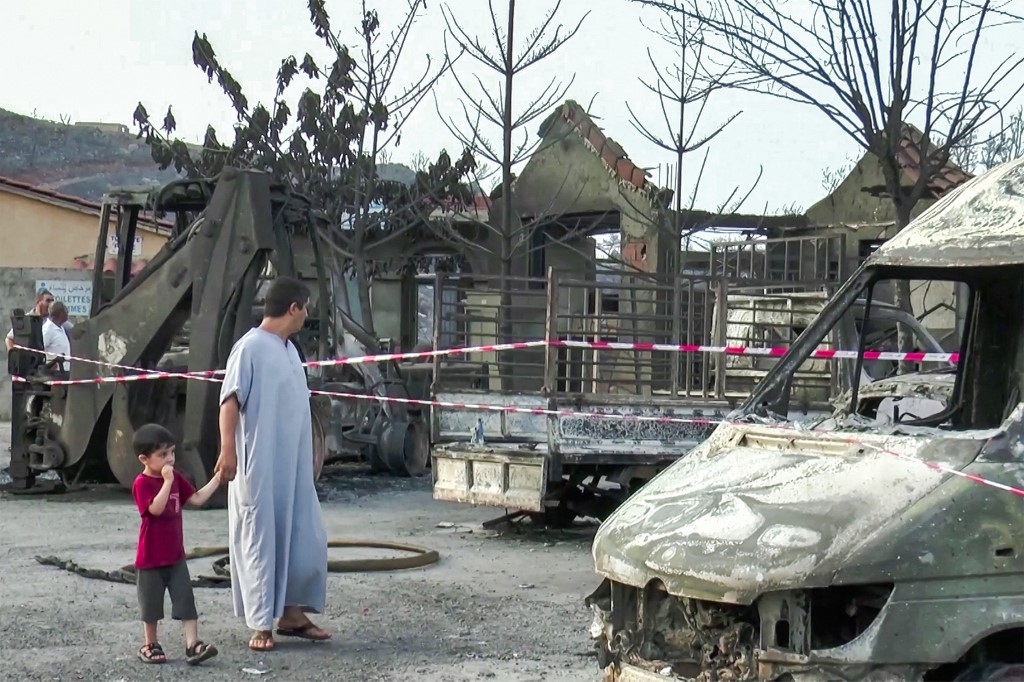
Sitting on a wall with his head in his hands, Abdelaziz Chibane is a shell of his former self.
It's been three days since the restaurant waiter, who's in his mid-30s, became the face of Ait-Oussalah, a small village nestled in Algeria's northern Kabylie region.
On the night of 22 July, it was among the worst of the villages ravaged by forest fires that spread across much of the country. At least 16 of the 34 people who are known to have died were from here.
"We all died with them," a grieving Chibane tells Middle East Eye.
That night, his sister, sister-in-law, cousins and two nephews - Islam, seven, and Aksel, five - perished in the disaster.
Struggling to hold back his tears, the intense shock and pain is etched on his face.
"You can see all around... There's nothing left for us."
He stands and points at burnt houses, orchards that no longer exist and a forest on the horizon that will forever be a reminder for the survivors of the disaster that afflicted their village.
As Chibane weeps, Abderrahmane Zenoud, a 68-year-old pensioner who lost his daughter-in-law and two grandchildren, approaches.
"I would have liked to have died too," he says, cradling a hot cup of coffee.
'The fire brigade didn't come. It wasn't until the following day, Monday, that planes flew over the village. It was too late'
- Abderrahmane Zenoud, survivor
"My father died for this country [as a combatant in the war of independence between 1954 and 1962], only for me to end up in this disaster. My body is here, but my soul has gone with the dead.
"Everything you see here used to be orchards, apple trees whose fragrance went beyond the village, pear trees, olive trees... Now it's all burnt down."
His son, Samir, also struggles to contain his grief over their deaths. As if fatalism could soothe the pain, he says: "God gave and God took away."
He, too, begins to cry as a group of men approach and try to console him.
Once home to around 180 people, Ait-Oussalah lies close to the edge of a mountain. A few metres away, a main road connects the village to others in this desolate region.
At the village square, a shelter is still standing, decorated in the colours of JS Kabylie, the local football club. But just next to it, several hundred-year-old olive trees have been destroyed, stumps and roots the only reminders that they were once here.
'Not even the cemeteries were spared'
Looking out from the centre of the village, nearly everything lies in ruin. The local mosque, known as the mosque of the ancestors, has lost its roof, and a few tombs can be seen amid the charred remains.
Zenoud takes the lead on a tour of the village. A few women, their faces covered, fetch water from a fountain next to the mosque. They stop to talk to us.
"God didn't do that. It's men who did this," says Fatima, a woman in her 50s.
She believes, like many others, that arsonists were behind the fire. According to local media, dozens of people have already been arrested in the fire-stricken area.
It's now early morning and the sun is beginning to rise. Zenoud insists on going to the cemetery. He points to the graves of his relatives: "That's my aunt's grave. There's also my grandmother and over there, my grandfather", he says, pointing to the few burying places that are still visible but with the writing on the headstones no longer legible.
For the most part, it is as if the graves no longer exist, just as the ash and carob trees that sheltered them are no more.
Before reaching the houses, the flames came up from the valley through here, he says.
"Is it just? Even the cemeteries were not spared. No, I don't blaspheme when I say that God is too good, he wouldn't do that."
We make our way uphill through the village along paths where the acrid smell of burnt flesh is everywhere.
"It's my cousins' livestock that's been decimated," Zenoud says as we walk over the ruins of old houses built from simple hewn stone.
Pieces of concrete, red tiles, breeze blocks, beams, glass and straw mats litter the ground.
'No drinking water'
Zenoud is eager to show us his house, where his nephews and his sister-in-law used to live. From the outside, the house, unfinished like most of the houses here, is relatively untouched.
His father, Rabah, in his 70s, slender and with a salt-and-pepper beard, follows us upstairs with the keys to the flat.
Inside, everything has been turned upside down, but neither the doors nor the windows are burnt or broken, which raises unanswered questions of how the fire got in.
At the sight of his missing grandson's little shoes, the sobs of the old man intensify. He clutches the sandals to his chest. "If only I'd been the one [to die]."
In a raised part of the village, the inhabitants have set up a makeshift camp to welcome visitors and the prospect of donations. Coffeepots, teapots and boxes of cakes are laid out on a table.
In a garage, bottled water, cartons of milk, rolls of toilet paper and other donations have been stored.
"We were asleep when we realised that the fire was approaching," Tahar Chibane, a young farmer with a long beard, told MEE.
Like many of his neighbours, he took refuge in a house high up on the hill. Everyone from his family is safe and accounted for, he says.
The villagers, who have seen most of the young people leave for exile in Europe, especially France, take the occasion to raise other issues.
Ait-Oussalah, for example, is not connected to the drinking-water network, although the region is full of water. The Romans drew it from the lands of Toudja to supply the ancient city of Saldae, now Bejaia and the largest city in Kabylia, with an aqueduct that can still be seen today.
Instead, locals draw water from the fountain or buy cisterns.
Help came too late
The residents say that the emergency services were absent at the time of the tragedy.
"The fire brigade didn't come. It wasn't until the following day, Monday, that planes flew over the village. It was too late," says Zenoud. "The authorities came later. They promised compensation, but can they bring back my nephews, my cousins?" he asks, in the presence of his brother Abdelhamid, the father of the missing boys.
In a press release issued on Wednesday, the National Agricultural Mutual Fund announced that it would pay compensation to the victims of the fires within 72 hours of receiving an expert assessment of the damage.
In the meantime, the survivors are waiting to receive the remains of their relatives, which are still in hospitals in Bejaia and Azeffoun (Tizi-Ouzou), further west, for DNA analysis.
On the eastern edge of the village, two wrecked cars lie on the side of the road. Sixteen villagers, including the nephews of Abdelaziz Chibane and Zenoud, were trapped by the fire.
As it approached the village, some tried to flee, nine in a Renault Kangoo and seven others in a Dacia Duster. The cars became surrounded by flames, and only charred human remains were left by the time civil protection officers arrived.
The fire is believed to have started in Oued-Dess, a village about 10km from Ait-Oussalah.
Before reaching Oued-Dess, we pass through what was once considered a green gem. Now, black has replaced the green, to the point where it is difficult to distinguish the asphalt of the road from the rest of the landscape.
Even the rocks have turned black, dead animals lie beside the road, and the smell of ash has replaced that of plants and flowers.
An empty husk in the middle of nowhere
The river, which used to be covered with a diverse selection of trees and shrubs, is now bare and its pebbles have changed colour.
In Oued-Dess, the Amsvridh restaurant, also known as Le Routier, is but an empty husk in the middle of nowhere. Charred cars are a reminder of the fire that consumed everything in its path.
The restaurant manager, Samir, and his brothers are safe, as well as some of the employees who had taken refuge in the cold room. The neighbours and 10 soldiers who had camped in barracks opposite the restaurant died.
Last Wednesday, everyone gathered to visit Kaoutar Krikou, the minister for solidarity.
Idir Touahri, who lives in the neighbouring village of Ait-Ali, is angry. He blames the authorities for having "prevented the villagers" from clearing land around their homes and the forest.
"We don't understand why every time someone tries to clear the roadside or the forest the gendarmes confiscate the machinery," he tells MEE.
Bilal Ait-Aissa, deputy mayor of the commune of Toudja, says: "There is a law that protects the forest estate. However, villagers often build without permission, and the state is afraid that, under the guise of clearing land, the inhabitants will take over the forest areas."
Ait-Aissa pleads for this law to be adapted to the reality of the villages, who are not used to consulting the authorities before building a house or any other facility.
Meanwhile, the mayor, Ahmed Slimani, is in despair. His community has no resources and is helpless following the disaster.
"We're right in the middle of the second-largest forest in the wilaya [region]," says Ait-Aissa.
"For years now, we've been asking for an advanced civil protection post to be set up so that we can intervene quickly. But nothing has happened.
"The fire brigade couldn't get there in time because they had to come from other communes. The road was already blocked by flames."
Middle East Eye propose une couverture et une analyse indépendantes et incomparables du Moyen-Orient, de l’Afrique du Nord et d’autres régions du monde. Pour en savoir plus sur la reprise de ce contenu et les frais qui s’appliquent, veuillez remplir ce formulaire [en anglais]. Pour en savoir plus sur MEE, cliquez ici [en anglais].


